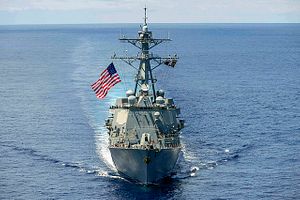Commander and Judge Advocate Jonathan G. Odom, whose distinguished service I respect, makes a valid definitional point: Technically, even an innocent passage (IP) can be included as a subset in the general category of Freedom of Navigation Operations (FONOPS), loosely and generically defined.
But legally and operationally, and as commonly understood, an IP is a fundamentally different animal from a traditional FONOP. One, the IP openly concedes the coastal country’s territorial sea claim whereas the typical FONOP directly challenges it.
Two, the IP deferentially acknowledges that it is transiting through a country’s 12-mile territorial zone. The traditional FONOP defiantly asserts it is sailing on the high seas. And three, the IP proceeds expeditiously through the zone with radar deactivated, helos and drones ship-bound, without exercise or maneuvers. The “pure” FONOP acts like a Navy ship always does at sea, proudly, multi-dimensionally, and vigorously.
One operation tip-toes cautiously and respectfully through another country’s recognized waters; the other ignores illegal sovereignty claims and plies freely and boldly on the high seas. It is legally and operationally impossible for a single operation to simultaneously accomplish both missions.
The entire FONOPS program writ large is one of responsive messaging. The coastal country sends the first message: These are our waters; stay out unless you do the following things:
- Notify us of your transit.
- Deactivate your weapons systems.
- Turn off your radar.
- Land your aircraft and other devices, manned and unmanned.
- Refrain from exercises, surveys, and research.
- Proceed quickly out of our waters.
And so on.
The IP response is: UNCLOS requires no notice but we acknowledge that these are your territorial waters and we will comply with all other conditions.
The traditional FONOP response is: UNCLOS supports none of your illegal demands. These are high seas and we will proceed accordingly.
The problem with the Obama administration’s tepid response to China’s aggressive moves is that it sends confusing signals: assertive rhetoric followed by half-hearted, muted performance.
The bottom line is that so far, no Navy ship has conducted a FONOP that challenged any of China’s territorial sea claims in toto, not simply on whether notice was required (which UNCLOS does not mandate for either an IP or a “pure” FONOP).
Both the USS Lassen in October and the USS Curtis Wilbur this month conducted IPs that conceded they were passing through territorial waters rather than traversing the high seas.
In that counter-productive environment, China keeps pressing because, while it registers its pro forma complaints, it is happy to have the U.S. constantly conceding its substantive territorial sea claims and arguing only about notice.
As I’ve written elsewhere, when the president, the secretary of state, the secretary of defense, and U.S. Navy commanders assert that “the United States will fly, sail, and operate wherever international law allows,” they should add the words “and in the manner it allows.”
The situation in the South China Sea requires more navigation and less legal explanation. Or, as Elvis would put it, what’s needed is “a little less conversation, a little more action; a little more bite and a little less bark.” The president should eschew the legalisms and unshackle the U.S. Navy to do its job of guaranteeing freedom of the seas.
Joseph A. Bosco is a member of the U.S.-China task force at the Center for the National Interest and a senior associate at the Center for Strategic and International Studies. He previously served as China country desk officer in the office of the secretary of Defense from 2005-2006.

































